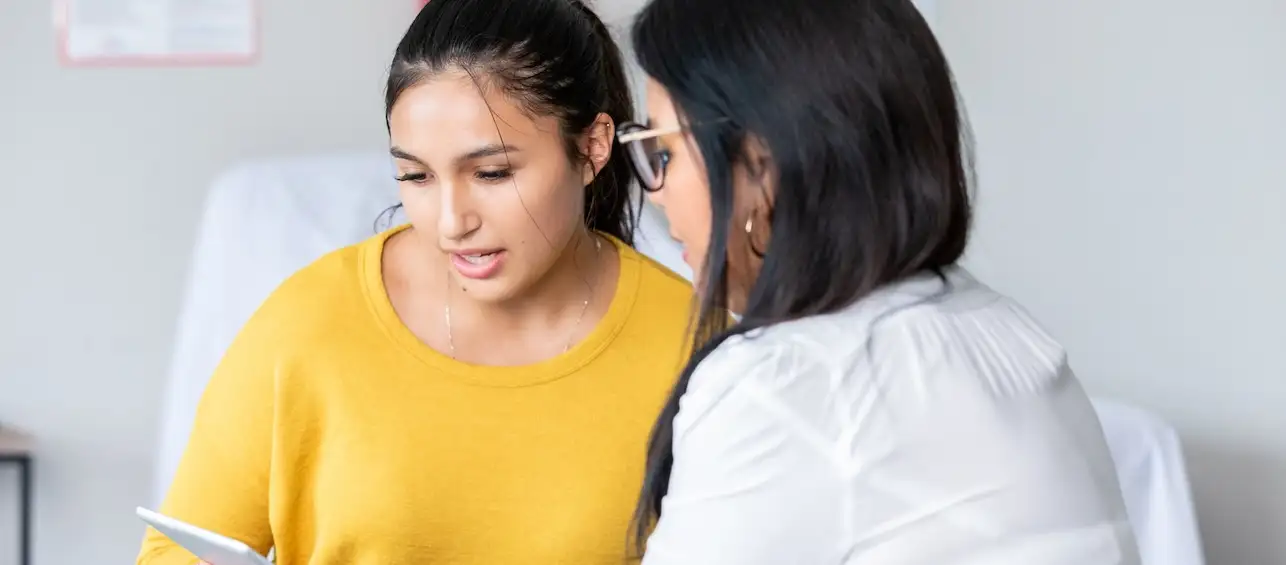Becoming a young adult can be hard. And let’s face it, there are a lot of changes at this time of life. Making the move to the world of adult healthcare is just one of the many changes that teens must manage.
Switching from pediatric to adult medical providers can be overwhelming if you’re not prepared. Whether your child has one primary care doctor or multiple specialists providing treatment, transitioning to a new care team is a process. Being prepared is the key to success.
Empowering Teens
As your child becomes a young adult, they’ll need to start working toward the move from pediatric to adult healthcare. We believe it’s important to begin talking with your child about transitioning care as early as age 12, with frequent conversations as they continue to grow.
For most teens, the goal should be to help prepare them to make thoughtful healthcare decisions for themselves as they get older. Early conversations and preparation are essential to assuring that your child continues to receive care without running into roadblocks along the way.
Know the Specifics
Supported Decision-Making
It is vital to understand that when a child turns 18, they become their own decision maker. They are responsible for making all decisions regarding their physical and mental healthcare, and financial needs. Most teens will find it useful to identify a close friend or family member who they can go to regarding healthcare concerns. This form of help is referred to as supported decision-making.
Types of Formal Support
In the event that a teen needs help with these decisions, a signed release of information might be all that is needed. Other teens may require significant help in making healthcare and financial decisions; this might require establishing a power of attorney (POA) for healthcare decision-making, or guardianship. Guardianship should be considered as a last resort, since guardianship restricts the young adult’s ability to make their own decisions.
While eventual “graduation” is our main objective, carrying it out gets complicated for many reasons. Some patients have complex conditions, some don’t. Some will need help managing their own healthcare as adults, while others won’t. Parents and guardians are a great asset in the lives of the patient and can help navigate these challenges.
Can Your Teen Answer These Questions?
To help with a successful transition to adult medical care, below is a list of questions that all teens, regardless of their medical situation, should be able to answer. This is by no means a complete list, but knowing the answers to these questions can start the conversation with your teen to prepare them for the eventual change:
- What are your medical conditions? Do you have any allergies?
- Who are your doctors, why do see them, and do you know how to contact them and schedule appointments?
- Who should you call in a medical emergency?
- Do you have any dietary or medical restrictions?
- What medications are you taking, and are there any interactions you should be aware of?
- Do you know how to fill a prescription?
- What should you do if you have a bad reaction to a medication?
- Do you know your family’s health history?
Other points to talk through with your teen include:
- If they know how long their current doctor will continue to see them
- If they have thought about where they will go for their adult medical care once they graduate from the pediatric setting
- Health insurance and what benefits are covered under their plan
- If they know what to do if they no longer have health insurance
Taking on the responsibility of one’s own healthcare builds self-esteem, resilience and self-advocacy. It’s a big deal, but with the right preparation, it will go smoothly. Our message for parents and teens is to think ahead and get ready. Talk to one another and to current doctors and other healthcare providers about it now, so that when the time comes, there will be no surprises.
Editor’s Note: Erica Koe-Krompecher, LISW-S, LICDC-CS, OCPC, CCTSW, also contributed to this blog post. She is a social worker in the Division of Adolescent Medicine and Teen Health at Cincinnati Children’s.







This is really good information. I sent my son off to college and freshman year he got really sick and we had not prepared him for how to navigate a complex medical system. I have freshmen in high school and I am already educating them on information they need to know about themselves and how to manage once they are outside the home. Lesson learned a little too late.
This is excellent information. My granddaughter will turn 25 this year and she comes off her mom’s insurance. This will definitely prepare both mother and daughter for what’s next.
Thank you LaDonna!
We also experienced how little our daughter knew the who’s ,what’s, why’s and where when it came from transitioning to adult care. This article was very knowledgeable and we have discussed the topic with her.
GREAT INFORMATION!!